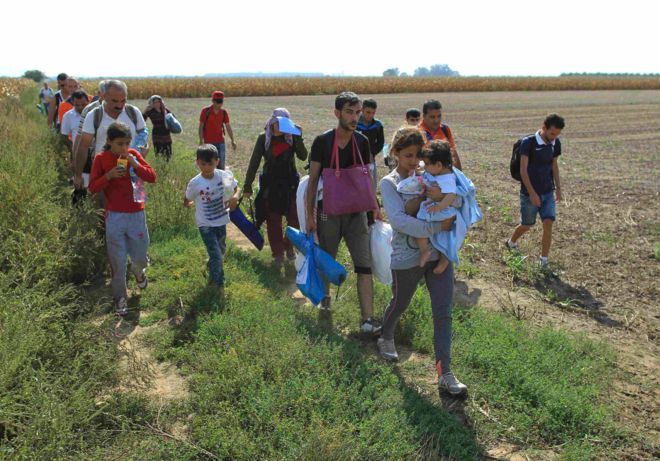After that,
the border between Serbia and Hungary have been closed last Monday, the
refugees find out the other route to get to the UE countries and they started
to cross through the Croatian border. However, hundreds of refuges are still
waiting near the Serbian border with Hungary. The Croatian Prime Minister said
that they are ready to receive and help them or direct those people where they
want to go. Moreover, many of the UE countries such as Austria and Slovakia with Hungary or Germany with Austria have restored the border controls.
The news
channels to compare where I found the information about this issue are:
Al Jazzera: http://www.aljazeera.com/news/2015/09/refugees-seeking-routes-border-closures-150916045558970.html
Information about these channels:
- Al
Jazeera (Arabic television channel based in Qatar with the worldwide broadcast.
Since 2006, Al Jazeera broadcasts in English).
- BBC News (the
public-service broadcaster of the United Kingdom, headquartered at Broadcasting
House in London. It is the biggest and the oldest national broadcasting organization).
By the
questions on the page about bias media, I will compare this news.
Is there a
lack of diversity?
The BBC has
over 200 correspondents based both in the United Kingdom and abroad. However,
there is a lack of diversity. The BBC News presenters and correspondents are
mostly British and white. That may have an impact on the bias. The Al Jazeera
Media Network has more than 4,000 highly experienced staff from over 70
nationalities, making their newsrooms the most diverse in the world.
From whose
point of view is the news reported?
In the both
channels, the point of view is the same. Both channels have sent theirs
correspondents to the place where it happens and made accurate reportage. However,
Al Jazeera has only made a reportage while BBC has made reportage and took some
pictures of the situation. Both channels have also collected a lot of
information and have quoted some things.
Are there
double standards?
No, I have not found any double standards.
Do
stereotypes skew coverage?
At both
news channels there are no any stereotypes. The all information is based on the
real stories and experiences. However, at the BBC New there may have some of the stereotypes in the relation to the countries, which have to struggle with the
refugees. Therefore, they can try to portray these countries in a bad light.
What are
the unchallenged assumptions?
The stories
based on facts on both news so there is no unchallenged assumptions.
Is the
language loaded?
They
language can be loaded by showing cruel pictures or videos in these news and by
writing horrible information about it and using stereotypes , which can cause
the various feeling about story.
Is there a
lack of context?
No, there is no lack of context.
Do the
headlines and stories match?
No. Both
channels have used a lot of information. The
headlines in both news match the story.
Are stories
on important issues featured prominently?
Yes. The
stories are on the front pages and on the editorial pages all the time.
In the quick summary it is a big problem of Europe. Many people are distrusful of decisions of the European politicians. Also, many times in the television I have heard that among the refugees may be terrorists and immigrants from Africa that are not escaping the war. The one visible thing between these two channels that I figured out is that BBC News called them as "migrants" but Al Jazeera called them as "refugees". Correctly, Al Jazeera called them in good way because migrants are people which want to change their living location while refugees are people which have to leave the area where they lived because of the threat to life, health, or freedom.
Sources:

No comments:
Post a Comment